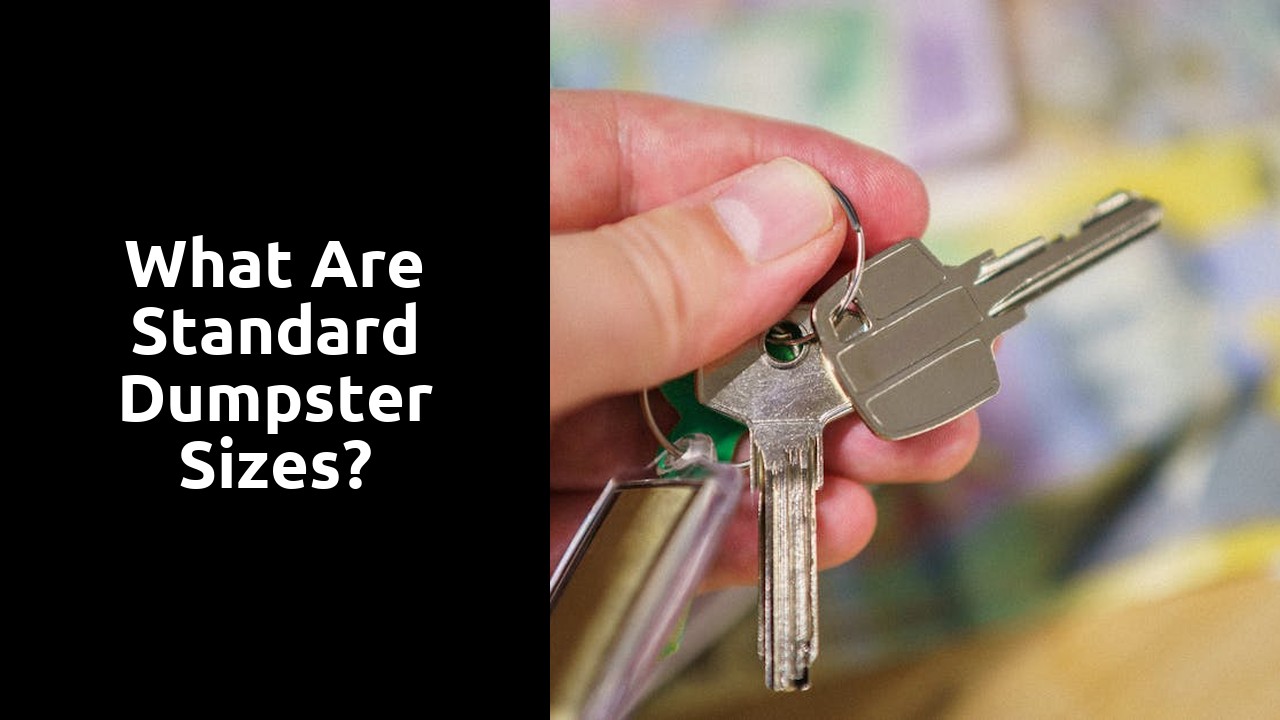What are standard dumpster sizes?

Table Of Contents
Dumpsters for Renovation Projects
When undertaking renovation projects, selecting the right dumpster size plays a critical role in managing debris effectively. Common sizes range from 10 to 40 cubic yards, with smaller dumpsters suited for minor remodels and larger options necessary for extensive renovations. A 15 or 20 cubic yard dumpster is typical for kitchen updates or bathroom remodels, while larger units are appropriate for total home renovations or additions.
Proper disposal of construction waste is essential for maintaining a safe work environment. Renovation projects often generate materials like wood, drywall, and metal, which require adequate space for removal. Choosing the right dumpster can streamline the cleanup process, ensuring that the workspace remains organized and allowing contractors to focus on the transformation rather than the clutter.
How to Select the Ideal Size
Selecting the appropriate dumpster size is crucial for efficiently managing waste during any project. First, consider the type of waste being generated and the scale of the task at hand. Smaller projects, such as yard cleanups or small renovations, typically require a compact dumpster, while larger projects like home renovations or construction may benefit from larger options.
Estimating the volume of waste can help clarify the required size. A rough guideline is to think in terms of cubic yards, with most residential dumpsters available in capacities ranging from 10 to 40 cubic yards. Assessing previous projects or consulting with a waste management professional can offer insights, preventing both over-renting and the hassle of inadequate space.
Waste Management and Disposal
Effective waste management relies on selecting the appropriate dumpster size based on the volume and type of materials to be disposed of. The right dumpster not only ensures compliance with local regulations but also promotes efficient and timely disposal. For residential projects, smaller sizes often suffice, while larger renovations or construction activities may require industrial-sized options. Category-based disposal keeps waste segregated, streamlining recycling and landfill processes.
Understanding local waste management protocols is crucial for proper disposal practices. Different regions may have specific guidelines regarding hazardous materials and recyclables. By adhering to these regulations, individuals and businesses can contribute to community sustainability efforts. Utilizing the correct dumpster size prevents overflow and discourages illegal dumping, ultimately fostering a cleaner environment.
Understanding Volume and Capacity
When selecting a dumpster, it's essential to grasp the volume and capacity to ensure it meets your project's needs. Dumpsters come in various sizes, typically ranging from 10 to 40 cubic yards. The choice of size hinges on the type and amount of waste generated. Smaller dumpsters are ideal for home cleanouts or small renovations, while larger options cater to substantial construction projects or cleanouts.
Estimating the volume required takes into account the density of materials being disposed of. For instance, heavy materials like concrete will fill a dumpster more quickly than lighter materials such as cardboard. Understanding these nuances helps in making a well-informed decision. Properly estimating the amount of waste can prevent the hassle of overloading a dumpster or needing an additional one for disposal.
Specialty Dumpster Sizes
Different projects may require unique solutions when it comes to waste disposal. Specialty dumpsters cater to specific needs that standard sizes might not adequately accommodate. For instance, construction sites often need larger containers to handle bulky materials, while residential cleanouts might benefit from smaller, more manageable sizes. Medical facilities generate hazardous waste that necessitates specialized containers designed for safe and compliant disposal.
In addition, some businesses may require dumpsters for particular types of materials. Food service industries might look for containers that can handle organic waste, while warehouses could need units optimized for recyclables. The availability of these specialty options plays a crucial role in streamlining waste management processes. Tailoring the dumpster choice to the specific needs of the project ensures efficiency and compliance with local regulations.
Unique Solutions for Specific Waste
Certain types of waste require specialized solutions to ensure safe and efficient disposal. For example, construction and demolition debris often necessitate a heavy-duty dumpster designed to handle the weight and bulk of materials such as concrete, metal, and wood. Similarly, hazardous waste like chemicals and electronic items must be managed with specialized containers that comply with regulatory guidelines to protect human health and the environment.
Additionally, some projects may generate unique waste streams that don't fit into standard categories. Yard waste, for instance, often necessitates a specific type of dumpster that accommodates organic materials like branches, leaves, and grass clippings. Likewise, when dealing with large appliances or furniture, tailored dumpster options are available, ensuring that these bulky items are transported and disposed of effectively while minimizing disruption to regular waste management services.
FAQS
What are the standard sizes of dumpsters available for rent?
Standard dumpster sizes typically range from 10 to 40 cubic yards, with common sizes being 10, 15, 20, 30, and 40 yards.
How do I determine the right dumpster size for my project?
To select the ideal size, consider the volume of waste you expect to generate, the type of materials you will be disposing of, and the duration of your project.
Can I use a standard dumpster for construction debris?
Yes, standard dumpsters are commonly used for construction debris, but it's important to choose a size that accommodates the volume of waste generated by your renovation or construction project.
What should I do if I have specialized waste that doesn't fit in standard dumpster sizes?
For specialized waste, such as hazardous materials or electronics, consider renting a specialty dumpster designed specifically for those items to ensure proper disposal.
Are there any restrictions on what can be placed in a dumpster?
Yes, most dumpster rental companies have restrictions on certain materials, including hazardous waste, chemicals, tires, and appliances, so it's important to check with your provider for specific guidelines.